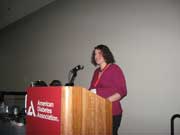DAY 1 - Sunday, June 26, 2011
Welcome
Greetings from the American Diabetes Association’s 71st Scientific Sessions
The editorial staff of Medical Economics brings you daily
coverage of breaking news, the latest research findings, and reports of interest to the
readers of Medical Economics, Drug Topics, Formulary, and Contemporary OB/GYN.
Our four-day coverage of this year’s American Diabetes Association’s 71st Scientific Sessions begins today and includes the results of major clinical trials and ongoing news
and information of interest to clinicians who treat type 1 and 2 diabetes.
|
|
NEW RESEARCH
Adding saxagliptin to metformin results in better glycemic control vs. uptitrating metformin dose

Vivian Fonseca, MD |
Adding saxagliptin to metformin instead of increasing the dose of metformin results in significant improvement in levels of hemoglobin 1c (HbA1c), fasting plasma glucose, and postprandial glucose in patients with type 2 diabetes with inadequate glycemic control despite being on a stable dose of metformin, according to the results of a randomized open-label study.
» MORE
|
|
EMERGING THERAPIES
High-dose salsalate improves fasting glucose; holds potential for preventing type 2 diabetes
Targeting inflammation with salicylate therapy to inhibit nuclear factor κB (NF- κB) activity may represent a novel strategy to prevent diabetes, said Peter Reaven, MD.
» MORE
|
|
PATIENT MANAGEMENT
Sulfonylurea monotherapy ups CVD risk vs. metformin in older diabetics
 Ying Qiu |
Older patients started on oral antidiabetic therapy with a sulfonylurea have significantly higher risk for cardiovascular disease (CVD) events than patients started on metformin.
» MORE
|
|
Bariatric surgery improves CV risk factors, but too many patients stop their cardiac medications
Bariatric surgery improves cardiovascular (CV) risk factors, with glycemia responding the most dramatically following surgery, said Sayeed Ikramuddin, MD. Over the long term, systolic blood pressure (SBP) and low-density lipoprotein (LDL) cholesterol respond less favorably, which may be partially explained by inappropriate cessation of medicines, he said.» MORE
|
|
HbA1c found wanting for diabetes screening in at-risk veterans
 Sandra L Jackson |
Slightly more than half of all U.S. veterans targeted for diabetes screening had unrecognized diabetes or prediabetes, indicating a need for widespread screening in this population.» MORE
|
|
CLINICAL TRIAL RESULTS
Four years on, intensive lifestyle changes yield benefits over standard diabetes care
Four years into a 13-plus-year study, an intensive lifestyle intervention (ILI) for patients with type 2 diabetes mellitus has produced sustained, significant improvements in glycemic control, systolic blood pressure, and high-density lipoprotein (HDL) cholesterol compared with standard diabetes support and education (DSE) programs, reported investigators with the Look AHEAD (Action for Health in Diabetes) trial.
» MORE |
|
Intensive lifestyle intervention sends some diabetes cases into remission
 Alain Bertoni, MD |
An intensive lifestyle intervention (ILI) for overweight and obese people with type 2 diabetes has induced significantly more remissions of diabetes than standard diabetes education.
» MORE |
|
FDA attempts to promote innovation through guidance and flexibility
Although the regulatory environment in the U.S. has been criticized for stifling pharmaceutical innovation and investment, several targeted Food and Drug Administration (FDA) activities have been designed to support innovation, said Douglas Throckmorton, MD, Deputy Director for Regulator Programs, Center for Drug Evaluation and Research at the FDA.» MORE
|
Medical Economics is pleased to share this ADA conference coverage with the readers of:
 |
|
From the conference floor
|
DISCLAIMER:
This information has been independently developed and provided by the editors of Medical Economics. The sponsor does not endorse and is not responsible for the accuracy of the content or for practices or standards of non-sponsor sources.
|
|

Exhibit Hall Hours
Sunday, June 26
10 a.m. – 4 p.m.
Monday, June 27
10 a.m. – 2 p.m.
We welcome your feedback!
Please send your comments to:
Medical Economics editorial staff
medec@advanstar.com |
|
